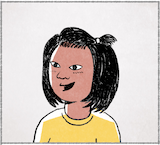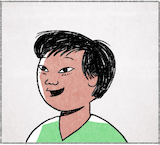

พุหญิงคนนี้เขากำลังเฮ็ดหญัง เบิ่งหน้าตา เบิ่งซงเบิ่งลักสะนะท่าทางแล้ว เขากำลังยิ้ม หลือว่าสิหัวล้อนั้นเองเนาะ แต่ว่าเบิ่งซงคักๆ แล้ว เขากำลังยิ้ม
เป็นหญังเขาคือยิ้ม เขากะอาดสิมีความสุข หลือว่าเขาอาดสิมีสิ่งที่เฮ็ดให้เขาดีใจ หลือว่าให้เขาพูมใจ เขากะเลยยิ้มออกมา
ขั้นพุหญิงคนนี้ เขาบ่มีสิ่งที่เฮ็ดให้เขาพูมใจ หลือว่าสิ่งที่ให้เขาดีใจ เขากะอาดสิบ่ยิ้มออกมา เพาะว่าแต่ละคนกะบ่ได้สิยิ้มได้ตะหลอดเวลา ขั้นบ่มีสิ่งที่ดี เขากะบ่ยิ้ม
10
พุซายคนนี้เขากำลังเฮ็ดหญัง เบิ่งลักสะนะท่าทางแล้ว เขากำลังยิ้มคือกัน
เขาอาดสิมีความสุขคัก มีความสุขอี่หลี เขากะเลยยิ้ม
ขั้นเขาบ่มีความสุข เขากะบ่ยิ้ม แม่นบ่ เจ้าว่าคือข้อยบ่ ขั้นเขาบ่มีความสุข เขากะบ่ยิ้ม เขากะฮ้องไห้ เขากะหน้าบูดอึ้งตึ้งพุ้นแหล้ว ขั้นเขาบ่มีความสุขนั้นหละเนาะ
Link to overview page
Link to dictionary
| Isaan | Pronunciation | Tones | Thai | English/Notes |
|---|---|---|---|---|
| พุหญิง | phu-ɲiŋ | H-M | ผู้หญิง | woman, female |
| คน | khon | HR | คน | person, people |
| นี้ | ni: | HF | นี้ | 1. this 2. here |
| เขา | khao | M | เขา | personal pronoun: he, she |
| กำลัง | gam-laŋ | M-HR | กำลัง | auxiliary indicating continuous or progressive action |
| เฮ็ด | het | H | ทำ | to do, to make |
| หญัง | ɲaŋ | M | อะไร, เป็นหญัง = ทำไม | 1. what {เขากำลังเฮ็ดหญัง = What is he doing?} {ธูปเอาไว้เฮ็ดหญัง = What are incense sticks for?} 2. something, anything, (nothing) 3. เป็นหญัง[...]คือ in initial position: why {เป็นหญังเขาคือใส่บักพิกลงไปในกวยเตียว = Why is he putting chili in [his] noodle soup?} {เป็นหญังหน้าต่างมันคือเปิด = Why is the window open?} {เป็นหญังมันคือมีควนไฟ = Why is there smoke?} |
| เบิ่ง | bəŋ | H | ดู | 1. to look at, to see, to watch {เบิ่งโทละทัด = to watch TV} {เบิ่งหนัง = to watch a movie} 2. to guess {เบิ่งซงแล้ว ... = [I] guess / from what it looks like ...} |
| หน้าตา | na:-ta: | LF-M | หน้าตา | face |
| ซง | soŋ | HR | ทรง | 1. shape, form 2. as if, like Notes: translation to be confirmed |
| ลักสะนะ | lak-sa-na | H-M-H | ลักษณะ | feature, characteristic, quality |
| ท่าทาง | tha:-tha:ŋ | H-HR | ท่าทาง | 1. expression, look, manner 2. gesture 3. posture, appearance |
| แล้ว | lɛ:o | HF | แล้ว | 1. finished 2. already 3. and then, and next (especially แล้วกะ) 4. auxiliary for past tense |
| ยิ้ม | yim | HF | ยิ้ม | to smile |
| หลือ | lʉ: | M | หรือ | or |
| ว่า | wa: | H | ว่า | 1. that, as {คำว่า X = the word X} 2. to say |
| สิ | si | M | จะ | future tense auxiliary {เขากำลังสิตื่น = he's about to wake up} {สิไปตะหลาด = [I'm] going to the market} |
| หัวล้อ | hu:a-lɔ: | M-HF | หัวเราะ | to laugh |
| นั้นเอง | nan-e:ŋ | HF-M | นั่นเอง | 1. there 2. sure enough 3. emphasizes that the preceding is the topic or has been mentioned before Notes: Thai loan |
| เนาะ | nɔ | H | เนาะ | final particle: makes the statement softer, looking for agreement |
| แต่ว่า | tɛ:-wa: | H-H | แต่ว่า | 1. but 2. only {ฮู้แต่ว่าเขายืนอยู่พุเดียว = I only know that he's standing there by himself} |
| คัก | khak | H | intensifier: very, very much | |
| เป็น | pen | M | เป็น | 1. to be, to exist 2. to be able to 3. to suffer, sth. happens to 4. เป็นหญัง[...]คือ in initial position: why? {เป็นหญังเขากะคือแปงฟัน = Why is he brushing his teeth?} {เป็นหญังเคี่ยงบินมันคือสิตก = Why is the airplane falling down?} |
| คือ | khʉ: | HR | คือ | 1. to be, to resemble, like, as 2. why {บักหล้าคือบ่เก็บโต่ะแน่ = [addressing a young boy] Why haven't you cleared the table?} |
| กะ | ga | M | ก็ | 1. then, consequently 2. also |
| อาด | a:t | LF | อาจ | 1. might, may, will 2. likely |
| มี | mi: | HR | มี | 1. to have 2. there is |
| ความสุข | khwa:m-suk | HR-M | ความสุข | happiness |
| สิ่ง | siŋ | H | สิ่ง | thing, object |
| ที่ | thi: | H | ที่ | 1. that, which {คนที่ยืนอยู่ฝั่งขวา = the person which is standing on the right = the person standing on the right} {เว้าคำที่บ่สุพาบ = to speak words which are impolite = to speak impolitely} 2. for ordinal numbers {ที่สาม = third} |
| ให้ | hai | LF | ให้ | 1. to give {หมอกำลังเอายาให้คนป่วยกิน = the doctor is giving the patient medicine} 2. for 3. to allow, to be allowed |
| ดีใจ | di:-jai | M-M | ดีใจ | happy, glad |
| พูมใจ | phu:m-jai | HR-M | ภูมิใจ | proud, to be/feel proud |
| เลย | lə:i | HR | เลย | 1. futher on, beyond, past {เข็มน้อยเลยเลขสิบสองไป = the minute hand has passed number twelve} 2. too much 3. at all 4. definitively 5. completely, utterly |
| ออก | ɔ:k | LF | ออก | 1. to go out, to leave 2. out |
| มา | ma: | HR | มา | 1. to come 2. auxiliary expressing action towards the present or focal time {กะคุเฮ็ดมาจากอี่หยัง = What is the bucket made of?} {แล้วเขากะเก็บเงินจากพุนั้นมา = and then she takes the money of that person} |
| ขั้น | khan | LF | เมื่อ | when, if |
| บ่ | bɔ: | H | ไม่ | 1. no, not 2. question particle, transforming a statement into a question Notes: spelling exception in line with common usage on social media |
| เพาะว่า | phɔ-wa: | H-H | เพราะว่า | because |
| แต่ละ | tɛ:-la | H-H | แต่ละ | each {มือแต่ละข้างกะสิมีห้านิ้ว = each hand has five fingers} {แต่ละมื้อๆ = each day} |
| ได้ | dai | HF | ได้ | 1. can 2. to get, to obtain 3. before verb: indicating past tense 4. บ่ได้ + verb: not |
| ตะหลอดเวลา | ta-lɔ:t-we:-la: | M-LF-HR-HR | ตลอดเวลา | all the time, always |
| ดี | di: | M | ดี | good |
| พุซาย | phu-sa:i | H-HR | ผู้ชาย | man, male |
| คือกัน | khʉ:-gan | HR-M | เหมือนกัน | 1. also, likewise, similarly {ยินดีที่ได้ฮู้จักคือกันคับ = Nice to meet you too!} 2. in negative sentences: either {บ่ลู้คือกัน = I don't know either} {จักคือกัน = I don't know (either)} |
| อี่หลี | i:-li: | H-M | จริง | intensifier: really Notes: pronunciation: also realized as อี่หลิ |
| แม่นบ่ | mɛ:n-bɔ: | H-H | ใช่ไหม | question particle: ..., right? ..., isn't it? ..., don't you? etc. {เจ้าได้เห็นสิ่งนั้นแม่นบ่ = You've seen that, haven't you?} {ฝนกำลังตกแม่นบ่ = It's raining, isn't it?} {นี้คือกะคุแม่นบ่ = This is a bucket, isn't it?} |
| เจ้า | jao | HF | คุณ | 1. personal pronoun: you 2. owner, boss, master |
| ข้อย | khɔ:i | LF | ผม, ฉัน | personal pronoun: I |
| ฮ้องไห้ | hɔ:ŋ-hai | HF-LF | ร้องไห้ | to cry, to weep |
| หน้า | na: | LF | หน้า | 1. front {ปะตูหน้า = front door} 2. face {เขากำลังล้างหน้า = he's washing his face} 3. auxiliary: conditional tense {เขาหน้าสิเป็นพุบ่าวพุสาวกัน = they are probably groom and bride} {กะหน้าสิส้มอยู่ = it's likely to be sour} 4. season {หน้าฮ้อน = hot season} 5. page 6. clf. for pages {เฮาอ่านฮอดหน้านั้นแล้ว = we've read until this page} |
| บูด | bu:t | LF | บูด | sullen, displeased |
| อึ้งตึ้ง | ʉŋ-tʉŋ | HF-HF | บูด | sullen, displeased |
| พุ้นแหล้ว | phun-lɛ:o | HF-LF | นู่นแหละ | auxiliary for emphasis at the end of a phrase Notes: variant of พุ้นหละ |
| นั้นหละ | nan-la | HF-M | นั่นแหละ | auxiliary for emphasis at the end of a phrase |